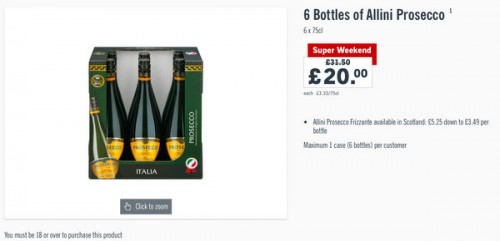
Yesterday people queued for hours outside branches of discount supermarket Lidl, all for a six-pack of cheap Prosecco.
If you were one of the lucky first 20 or so in the queue, you’d be able to get a six pack of an already cheap Prosecco for just £20. This is pretty much the cost of the duty and VAT on the wine, so Lidl were using this as a loss leader to get people into their stores.
It’s cheap advertising. If Lidl were limiting the quantities as much as reported, then taking their normal sale price of the wine (£5.79), the cost to them is going to be in the region of £150 000.
But limiting offers like this ends up upsetting customers who’d set their hearts on cheap bubbles. The newspapers were full of stories of unhappy queueing punters who went home empty handed (e.g. here and here).
What does this tell us?
First of all, people love a bargain. And they aren’t rational: once they sniff a bargain reason departs them. Getting hold of one of these six packs has saved them £14. And for that, they had to queue and lose their Saturday morning lie in.
Second, Prosecco has traction as a brand. It is seen as desirable, and clearly people feel that even cheap Prosecco delivers enough pleasure to queue outside Lidl for. It’s one of the wine world’s success stories.
Third, I think this sort of thing is both good and bad for wine. It is good that wine – even cheap Prosecco – gets mentioned and talked about in the mass media. The exposure of wine to normal people is good for wine sales. It normalizes wine drinking as something to be done that brings enjoyment. The wine trade wants people to turn to wine for their booze needs, and not spirits or beer. But it’s bad because it is part of the race to the bottom. Ever cheaper wine is bad because it means that wine producers get paid less, and then have to cut more corners in the production side. Ever cheaper wine is bad for wine quality. Supermarkets like this are the route to market for many producers, and if they are using cheap wine in a price war then eventually the margins for producers will be cut thinner and thinner.
Fourth, I think it strengthens the case for Minimum Unit Pricing (MUP). This would help take cheap booze off the shelves. There’s too much cheap alcohol out there, and I know from watching the behaviour of teenagers – many of whom have chaotic drinking patterns that is causing a lot of alarm on the part of public health officials – that there are some very cynical products that deliver a lot of alcohol for very little money, and which are sold through small convenience stores who don’t routinely age check, or who tolerate second hand buying on behalf of underage drinkers.
Decent wine would be untouched by an MUP of 50 p per unit. An average bottle of wine is 9-11.5 units (12%-14% alcohol), so would have to retail at £4.50-£5.75. This would provide extra margin for the producer/retailer for less expensive wine, and would take the pressure off in the race to the bottom of pricing. Would less wine be sold? Perhaps. But unless the wine trade supports MUP then it can have very little complaint about duty being used as a sin tax on the basis of public health concerns, which is what is happening now.
There is probably a fair bit of wine being sold below MUP pricing in the UK right now, but with the recent changes in exchange rates, and the effect of higher duty, this quantity is set to fall anyway. Aside from the addiction of selling very cheap wine, there are very few good arguments against MUP. There is just too much cheap alcohol for sale in the UK, and raising the price is just one of the few proven ways of reducing alcohol’s harm on a population level.
3 Comments on The Lidl Prosecco giveaway, and why we need Minimum Unit Pricing for booze


Minimum unit pricing looks like it will reduce consumption in a targeted way – cheap high alcohol drinks which are commonly abused. Unfortunately the media seemed to portray it as a tax, as if there would be an extra 50p on a unit, rather than just setting a floor. As an inner city GP I think it is a long overdue policy.
“There is just too much cheap alcohol for sale in the UK…”
Er Jamie, you are aware that we currently have by far the most expensive alcohol in Europe apart from Ireland?
Ever more expensive booze just makes it ever more forbidden fruit. The Lidl in Italy regularly sells basic vino da tavola for little more than a euro but you don’t see Italian teenagers rolling round drunk. Other continental countries where drink is half the price of the UK don’t have a drink problem either. Our problem with booze is cultural rather than economic. Something to do with our pressure-cooker competitive school and work culture rather than the price which is actually ridiculously high compared to our more civilised continental neighbours.
https://www.lidl.it/it/Offerte-settimanali.htm?articleId=3829
A difficult cultural problem not fixed by MUP alone. However go to A&E on the weekend (Thursday is the new Friday according to A&E consultants), and you’ll see 1 part of the real cost of cheap booze.